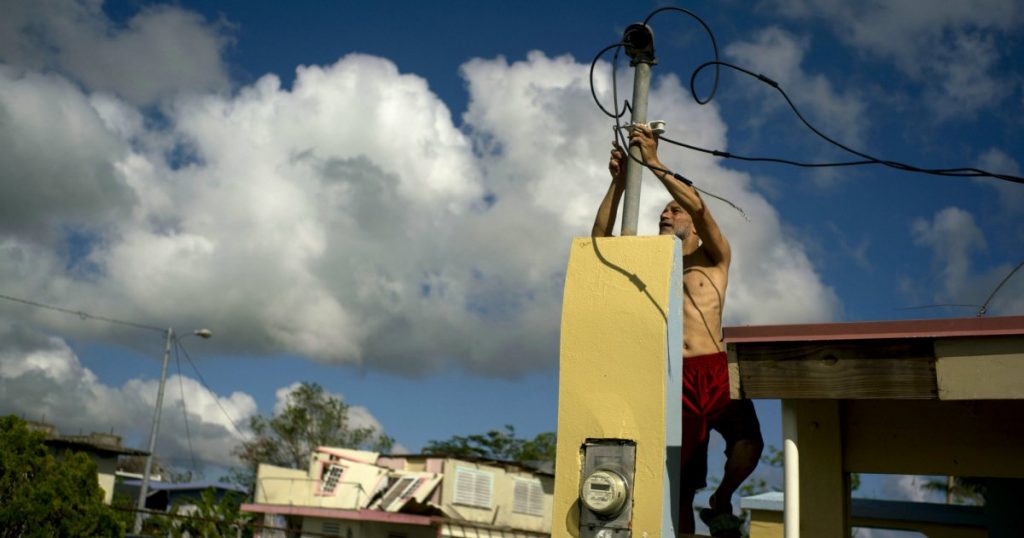How a Tenacious Group of Puerto Ricans Brought Light Back to Their Community
A resident tries to connect electrical lines downed by Hurricane Maria in Toa Baja, Puerto Rico.Ramon Espinosa/AP Photo
Oscar Carrion didn’t make the headlines—but thousands of people are grateful for the work he’s been doing.
When Hurricane Maria struck Puerto Rico and cut power on the island, Carrion and his four kids went night after night in darkness. He had to do something. “We were tired of hearing, ‘It can’t be done, it can’t be done,’” he told PBS’s Frontline. “We made the decision to try to continue forward.”
So he and his friends came together and raised $2,500 to buy a used bucket truck. They taught themselves about electrical wiring. And then Carrion led a DIY effort to restore power to several of Puerto Rico’s neighborhoods—repairing, replacing, and reconnecting electric lines in those areas. This video of his efforts, a part of Frontline’s look at Puerto Rico’s slow restoration after the hurricane last September, is worth your time.
Recharge is a weekly newsletter full of stories that will energize your inner hellraiser. For our first edition, we’re featuring people who have helped others, sought to make a better world, and found that justice does prevail. Sign up at the bottom of the story.
She had one shot with President Trump. She didn’t waste it. Mandy Manning, America’s current Teacher of the Year, met Trump last week when she was being honored at the White House. She used the opportunity to slip him letters from refugee and immigrant kids in Spokane, Washington. “I just had a very, very brief moment so I made it clear that the students that I teach…are dedicated and focused,” Manning said. “They make the United States the beautiful place that it is.” In the letters, the children write about their experiences coming to America—Manning hopes Trump will read them. (Newsweek)
Here’s some good news about an endangered species. Researchers have measured a bump in humpback whale babies over the past few years in the waters off Antarctica, partially because there is more krill to feed off and more ice-free days. A moratorium on commercial whaling that took effect in the early 1980s is another reason they’re thriving. It’s likely a large portion of the animals alive today were born after then. (New York Times)
Why not let kids “pay off” overdue fines by reading? Libraries around the country want to avoid penalizing young readers who return books late. This story, from the Los Angeles Times a few months ago, shows what a little forgiveness—and accountability—can do. By being able to “read away” library fines, Leilany Medina ended up reading much longer than required to work off her $4 in overdue charges. (Los Angeles Times)
They were arrested a half-century ago. Now they’re being honored. At 88, Margarita Melville returned to the scene of a Maryland protest 50 years ago for which she was arrested, handcuffed, and served nine months in a federal prison. She, her husband, and seven friends had stolen and burned 378 draft records in a protest at the height of the Vietnam War. “I personally put a match on them,” the Baltimore Sun quoted her as saying. The group, dubbed the Catonsville Nine, inspired similar protests across the country. Under increasing pressure throughout the unpopular war, Congress ended the draft in 1973. On Saturday, Melville came to be honored, as a state marker was unveiled near the site of the protest. “Don’t cause too much trouble,” someone called out at the ceremony, according to the Sun. Melville smiled. (Baltimore Sun)
That’s it for this edition! We hope Recharge helps you in the week ahead—and brings out the hellraiser in you. Have a tip or a link? Email us at talk@motherjones.com. And make sure you sign up for this weekly newsletter below.





